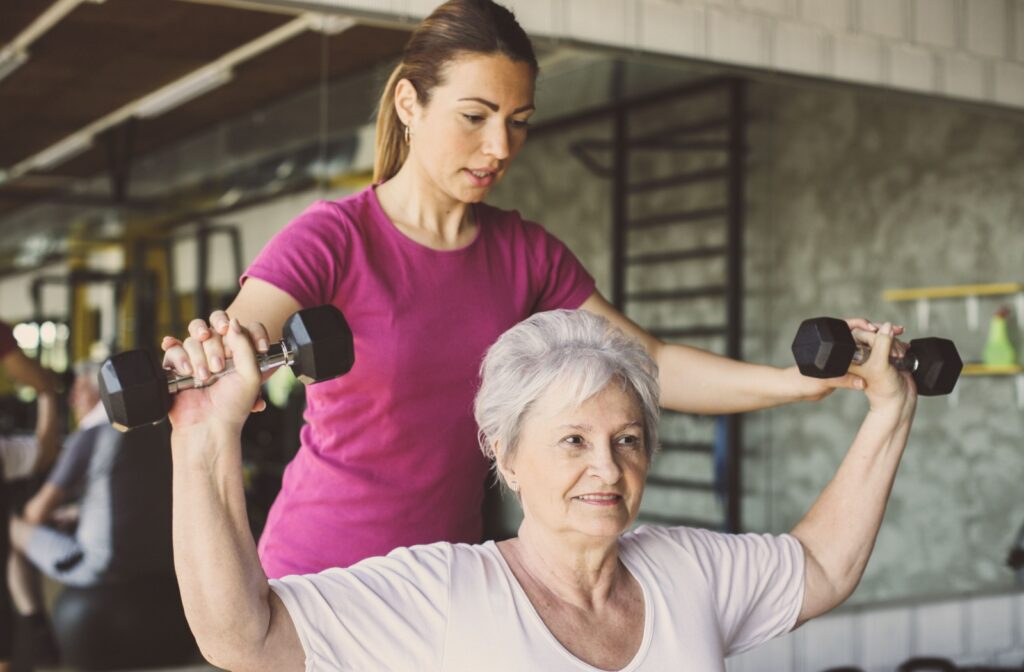Weightlifting, also known as strength training, is a type of exercise involving resistance to build muscle and increase strength. Traditionally, weightlifting has been associated with young athletes and bodybuilders. However, current trends show that weightlifting is also beneficial as we age.
According to the Centers for Disease Control and Prevention (CDC), physical activity is essential for all age groups, including those over 65. Regular physical activity can have numerous benefits, such as improving muscle strength, balance, and bone density. So the question remains: should senior citizens lift weights?
Weightlifting offers several advantages for older adults and should be included in your regular fitness routine. But there’s a caveat—approach it carefully and with proper guidance.
If you’re over 65, consult your doctor before starting a new weightlifting program. This step is especially important if you have underlying health conditions or are taking certain medications. Your doctor can provide valuable insights and recommendations on what types of exercises are safe and suitable for your needs.
What Are the Benefits of Weightlifting?
Weightlifting offers many health benefits, including:
- Increased muscle strength: As we age, our muscle mass naturally decreases. Weightlifting can help combat this loss by building and maintaining muscle mass, improving overall strength, and making daily tasks easier.
- Improved balance and stability: By strengthening muscles and improving coordination, weightlifting can also help improve balance and prevent falls, which is a common concern among older adults.
- Better bone density: Weightlifting is a weight-bearing exercise, meaning it puts stress on the bones. This stress can help stimulate bone growth and prevent conditions like osteoporosis.
- Increased metabolism: Our metabolism naturally slows with age. Weightlifting can help boost metabolism and burn more calories, making it easier to maintain a healthy weight.
- Improved cardiovascular health: Weightlifting can positively impact heart health by improving blood flow and lowering blood pressure.
Tips for Safe Weightlifting for Seniors
While weightlifting offers many benefits, taking the necessary precautions to prevent injuries is important. Here are some tips:
- Start slow: Ease into a weightlifting routine, and don’t push too hard in the beginning. Start with lighter weights and gradually increase them as you become more comfortable.
- Use proper form: Proper form is essential for preventing injuries. Have a trainer or professional demonstrate the correct form for each exercise before attempting it yourself.
- Take breaks: Rest days are just as important as workout days. Give your body time to recover and avoid overtraining.
- Listen to your body: If something doesn’t feel right, don’t push through the pain. Stop the exercise and consult a doctor if necessary.
- Stay hydrated: Drink plenty of water before, during, and after a weightlifting session to prevent dehydration.
- Consult your doctor: Before starting any new exercise routine, consult your doctor, especially if you have any preexisting medical conditions or injuries.
- Consider using machines: Machines can be safer and more stable compared to free weights. They also have built-in safety features that can help prevent injuries.
- Don’t neglect other types of exercise: While weightlifting is excellent for building strength, it’s important to also incorporate cardio and flexibility training into your routine.
- Stay consistent: Consistency is key to seeing results from weightlifting. Make sure to stick to a regular schedule and don’t skip workouts (unless you need to).
- Take precautions for joint health: Our joints can become more sensitive as we age. Warm up properly before lifting, and consider using joint support supplements.
- Stay motivated: Motivation and a positive mindset are crucial for weightlifting. Set realistic goals and celebrate your progress along the way.
- Find a workout buddy or join a class: Working out with a friend or joining a group exercise class can help make weightlifting more enjoyable and keep you accountable.
- Remember to rest and recover: Proper rest and recovery are crucial for anyone engaging in weightlifting. Make sure to listen to your body and take breaks when needed.
- Seek professional guidance: If you’re new to weightlifting or want more personalized advice, consider hiring a personal trainer with experience working with older adults. They can help create a safe and effective workout plan for you.
Empowering Fitness at The Lodge at Truitt Homestead
Weightlifting offers several benefits, including improved strength, balance, and overall health. By following these tips and incorporating weightlifting into your regular exercise routine, you can maintain a healthy and active lifestyle for many years. At The Lodge at Truitt Homestead, we offer a variety of fitness classes and equipment to help residents stay active and healthy. Our team is dedicated to promoting wellness and providing resources that support a high quality of life. Contact us today to learn more about our community and the services we offer.





